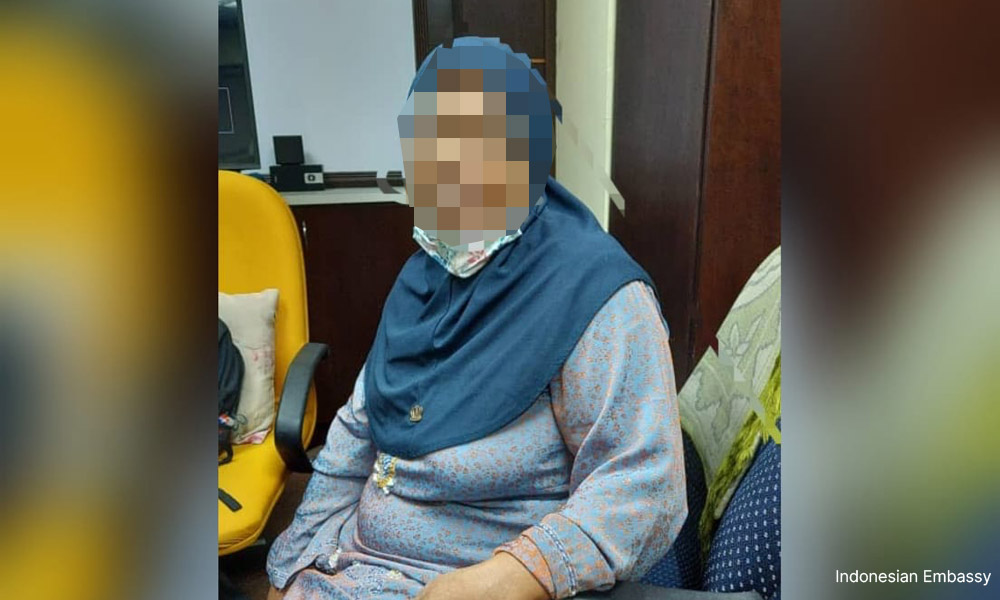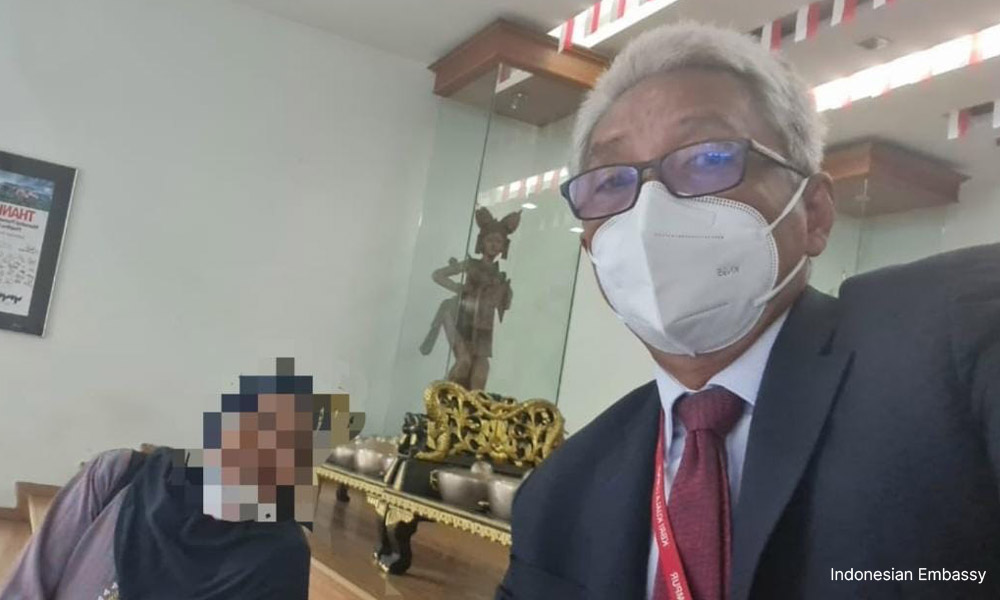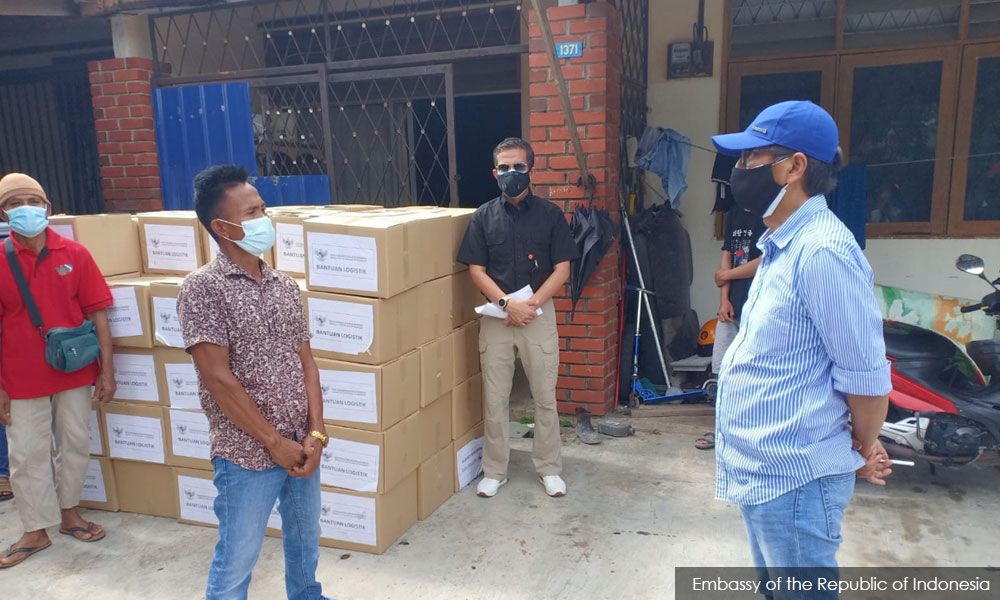In a bold new move and for the want of justice, Indonesia’s Ambassador to Malaysia Hermono seeks to underscore the importance of workers’ protection by imposing travel bans into his country - on Malaysians who exploit their Indonesian employees.
Hermono told Malaysiakini that the first Malaysians who will be restricted access into Indonesia are Radzuan Abu Hadzim and his wife Rosnajihah Ramli, who was unexpectedly acquitted of trafficking charges on Dec 9.
The couple has denied employing their Indonesian domestic worker over the past seven years, and it was learned that they are refusing to settle her unpaid wages too.
“Radzuan and Rosnajihah may have been acquitted of trafficking charges under Section 12 of the amended Anti-Trafficking in Persons and Anti-Smuggling of Migrants Act 2007/22 (Atipsom), but if justice is not served, they will be the first Malaysians barred entry into Indonesia for exploiting their Indonesian worker,” declared Hermono (above).
Hermono said the couple told the court in Klang dedicated to hearing Atipsom cases that they were providing temporary accommodation for 60-year-old Yati Karyati while she awaited to be deported.
However, Yati was discovered to be undocumented when she was rescued by the Selangor Labour Department in March following a complaint by her distressed daughter through an NGO in Indonesia.
The Indonesian Embassy worked with the Labour Department in tracking down Yati, whose employers had moved from their earlier Bukit Jelutong residence and also because Yati was not allowed access to a phone.
In a phone interview with Malaysiakini from Bandung in West Java, Yati said she asked to return home after two years when her salary was not paid despite her long working hours for the couple and their five children in their five-bedroom double-storey house - which also included four cars.
She said after three months into her work, one cash payment of RM282 (IDR1 million) was given to her daughter in Bandung through an agent - but after that, Yati never received any other payments.
She also relayed that her passport was withheld from her and she was disallowed to return home despite her longing to see and speak to her own five children.

Before she returned to Bandung, the Labour Department informed Yati that she was owed RM84,000 in unpaid wages.
Yati, who was informed of her employers' acquittal, said they deserved to be sentenced to jail if they did not settle her salary in full.
“I feel very sad, disappointed and angry.
“My salary is not negotiable and I want to be paid the full amount, even though I was forced to return home without my salary,” said a determined Yati.
Errant employers’ common trick
Hermono, on that note, said: “The employers claimed to have been providing Yati with food and accommodation for seven years, with no household chores while she waited to be deported.
“Their blatant denial of Yati’s employment despite the labour department’s rescue of the domestic worker was shocking.
“But more shocking was that both walked out free after holding their worker, a mother of five children, for seven years,” Hermono pointed out.
Hermono said the court had decided to acquit the couple because Yati was provided accommodation and food and she was free to walk out of the house at any time.
“But this is a common trick among employers and we have so many similar cases in our shelter waiting to be addressed.
“Employers hire undocumented workers with the false promise of legalising their employment but also stall on salary payments, confident the worker will not leave without their owed salary or legitimate documentation.
“They are also confident the law will not catch up with them because the worker was always free to walk out of the house anytime,” he explained, adding that this case verdict was a good example of that time-tested method.
Indonesia’s national dignity above all else
However, it is unclear if the prosecution would file an appeal but the couple is also facing three other charges under different laws, one of which is to recover Yati’s unpaid wages.
The couple told the court they were not guilty of offences under the other three charges which included the charge under Section 55B of the Immigration Act 1959/63 for employing undocumented workers.
They also pleaded not guilty to Section 14 and Section 66B of the Employment Act 1955/22 in relation to Yati’s dismissal and unpaid wages.
The inefficacy of the amended Atipsom Act and Malaysian authorities’ continued disregard for the protection of workers may lead to the Indonesian government resorting to imposing travel bans on more Malaysian employers.
“If the court decisions on the other charges don’t provide justice for Yati, then we will commence the process to blacklist Radzuan and Rosnajihah,” said Hermono.
At this point, the couple has denied employing Yati and it was learned that they are refusing to meet authorities to discuss the settlement of her unpaid wages.
“This couple doesn’t feel guilty about exploiting someone, so we hope the court will find them guilty and mete out the highest punishment under the remaining charges,” he said.

Hermono explained that the travel restriction into Indonesia would apply to all abusive employers, declaring that: “National dignity is above all else”.
In accordance with the Indonesian Decree of the Minister of Law and Human Rights Number 38 made in 2001, Hermono can request the minister to ban certain individuals from entering the territory of Indonesia for reasons including exploiting Indonesian citizens.
Bilateral tensions
This year alone, Malaysia’s disappointing commitment to improving the protection of Indonesian workers strained bilateral relations between the two countries.
The lack of commitment led to Indonesia resorting to the extreme measure of imposing a freeze on workers entering Malaysia for employment on two separate occasions.
Indonesians represent the highest group of migrant labour in Malaysia,. The International Labour Organization (ILO) estimates that there are 690,659 documented workers in Malaysia, but Hermono estimates the number of undocumented to be higher than those documented.
And Yati is one such example.
Yati maintains that she came to Malaysia to work for Rosnajihah in September 2015 and travelled to Johor via ferry on a tourist visa on the promise that her work permit would be finalised by her employer.
She was handed over to Rosnajihah at a location unknown to her, an hour's drive from Johor.
While Indonesia’s bilateral agreement with Malaysia, for the protection of domestic workers, signed on April 1, sought to address, among others, workers entering Malaysia for employment on tourist visas, there are thousands of women like Yati who came before the progressive agreement came into effect.

The country’s Law on Protection of Migrant Workers (No 18/2017) compels the Indonesian government to ensure a bilateral agreement is in place if there is no adequate protection in the domestic labour laws of receiving countries.
Between January 2021 and April this year, the embassy received 392 domestic workers seeking shelter from abusive employers, most of whom had not received their wages for more than six months.
However, Yati's case chalks up a different and undisclosed figure on rescued workers under the protection of the Labour Department.
“We are extremely disappointed with this verdict from the Atipsom court itself, which sends the wrong message - that it is okay to hire and harbour undocumented workers.
“The Malaysian authority’s commitment to combat forced labour is not apparent, even when there are many elements of forced labour in a single case,” Hermono said.
He said the case was closely monitored by the government as the protection of Indonesian workers abroad is enshrined in his country’s Constitution and mandated by law.
“Indonesia takes the protection of its workers very seriously and it is the first topic of conversation our president, Joko Widodo (Jokowi) touches on every time he speaks to any Malaysian politician,” he said.
Meanwhile, Prime Minister Anwar Ibrahim is aware of the strain on the bilateral relationship stemming from labour violations and that was evident when he took Jokowi's congratulatory phone call as the newly minted prime minister of Malaysia.
In a video that went viral with Jokowi's call placed on speaker mode, Anwar was heard giving his assurance to address labour concerns as one of the main issues between the two countries.

However, with legislation like the Atipsom Act already amended to provide better protection, it is widely argued that the enforcement of these laws is failing its purpose.
‘Strengthened’ Atipsom Act still ineffective
Prior to the third round of amendments to strengthen the Atipsom Act that came into effect in February this year, proving exploitation and coerced services was integral to a conviction, but difficult because coercion was very narrowly defined in the law.
The latest amendments quashed the definition of coercion and widened the definition of human trafficking, in keeping with the United Nations Trafficking in Persons (UNTIP) Protocol.
In the amended law, coercion is given less weight as just one element with room for a broad interpretation – “by means of threat or use of force or other forms of coercion”.
Hermono explained that Yati could not leave because she had no money, and was owed seven years’ salary.
"The monthly income owed to her was the reason Yati came to Malaysia to do domestic work at the age of 53.
“By withholding her salary and cutting off phone communication, the employers had abused her vulnerability and their power over her.
“They deceived her to withhold her passport in the pretence of applying for her work permit, which they never did,” Hermono explained.
He added that although Yati could walk out of the house anytime, running away without her passport and being undocumented prevented her from doing so or she would be risking incarceration in Malaysia’s detention camps.
It is unclear if the prosecution explored the couple’s reason for the seven-year wait for Yati’s return while several bouts of recalibration programmes had been held by the Immigration Department, with the latest programme having commenced last year.
The latest amendments to the Atipsom Act also introduced heavier punishment and before they were acquitted, Radzuan and Rosnajihah had been facing a maximum of life imprisonment or a term of no less than five years and whipping.
Malaysia’s poor understanding of trafficking
Malaysia’s poor track record in combating human trafficking is highlighted every year in the United States Trafficking in Persons (TIP) report which, for the past two years, placed this country at the lowest rank provided in that annual evaluation.
The past two reports pointed out that Malaysia's continued Tier Three ranking was mainly attributed to the government’s inability to meet minimum standards.
It also pointed out that Malaysia was not making significant efforts toward the elimination of people trafficking in the country.
In the 2022 report, it even pointed out its decision to maintain Malaysia’s Tier Three downgrade despite taking into consideration the impact of the Covid-19 pandemic on its anti-trafficking capacity.
The latest report also pointed out the lack of comprehension of the definition of trafficking, especially in cases where coercion was a primary element which led to many cases being dropped by the prosecution.
This can be discerned in the TIP reports and one such example is from the 2022 reporting year.
The report disclosed that Malaysia had convicted only five individuals for withholding the passports of employees under the Passport Act 1966.
However, the government did not report sentencing details for those convicted, nor did it prosecute or convict these individuals for potential human trafficking crimes. - Mkini




No comments:
Post a Comment
Note: Only a member of this blog may post a comment.